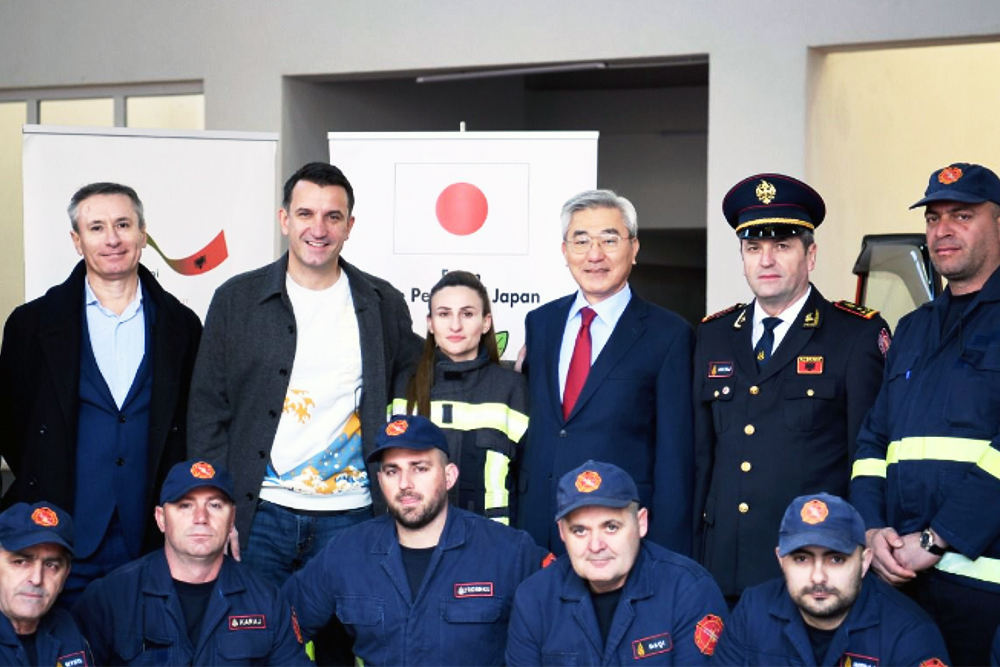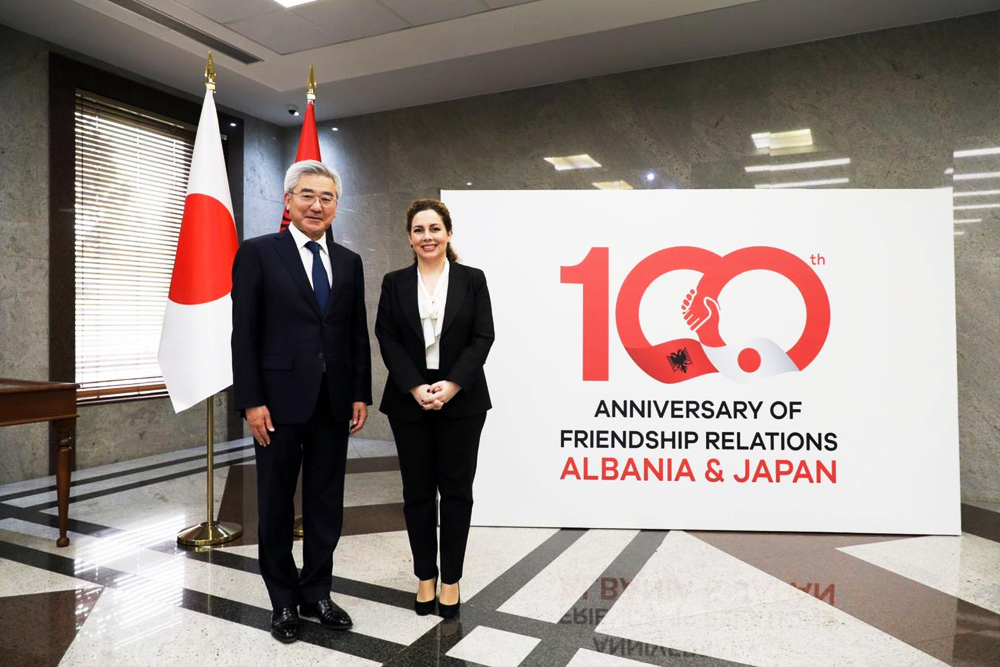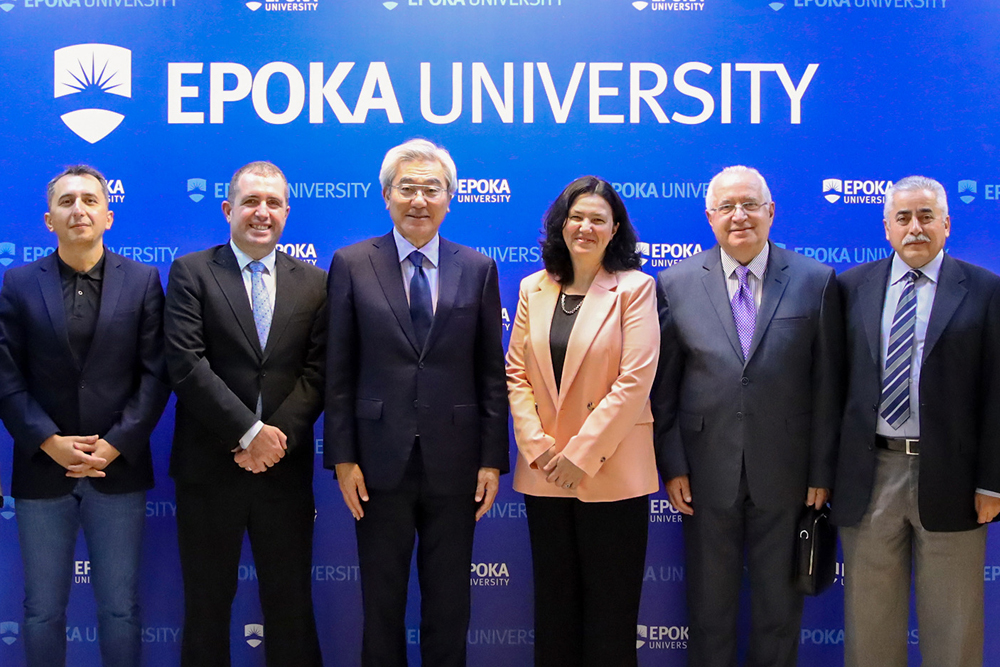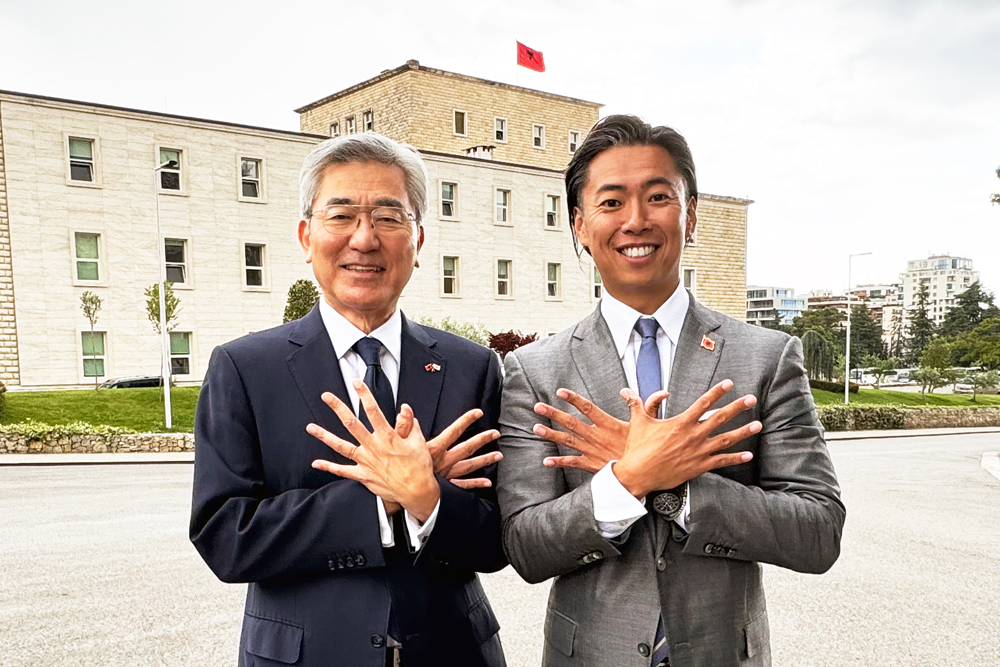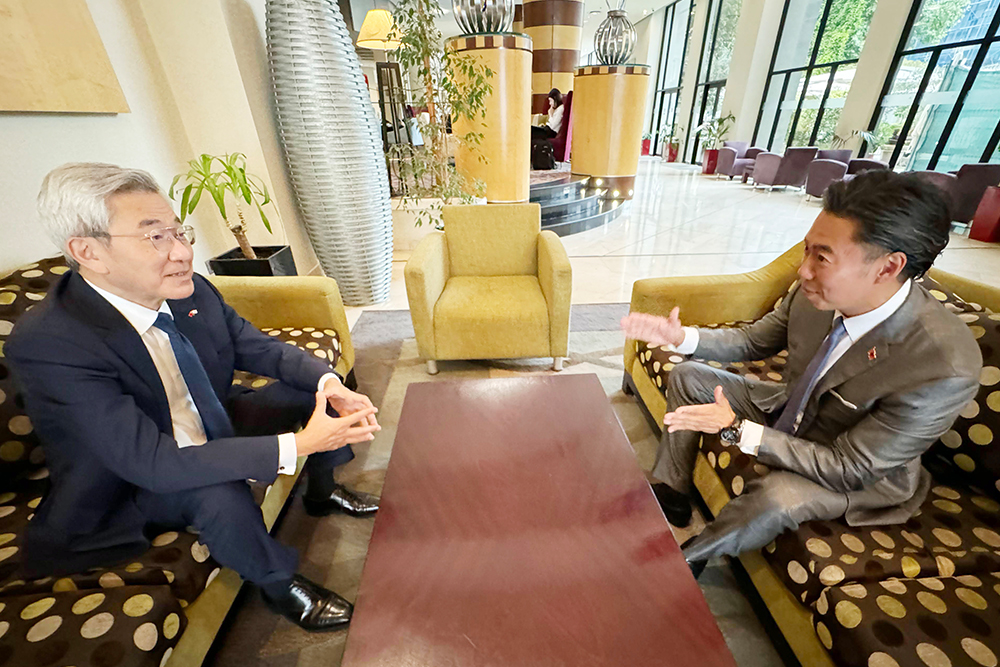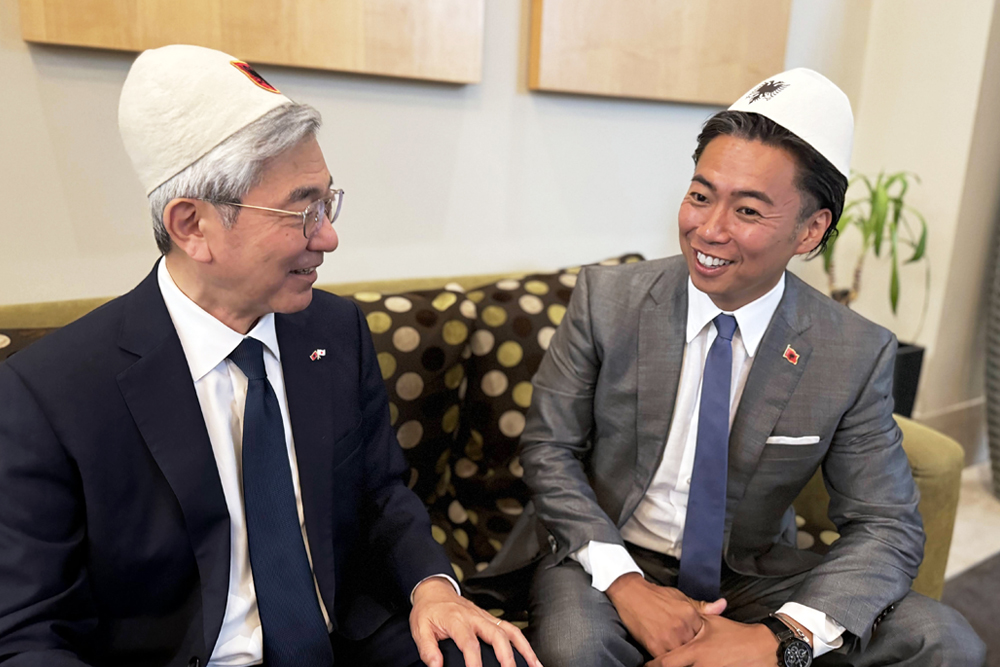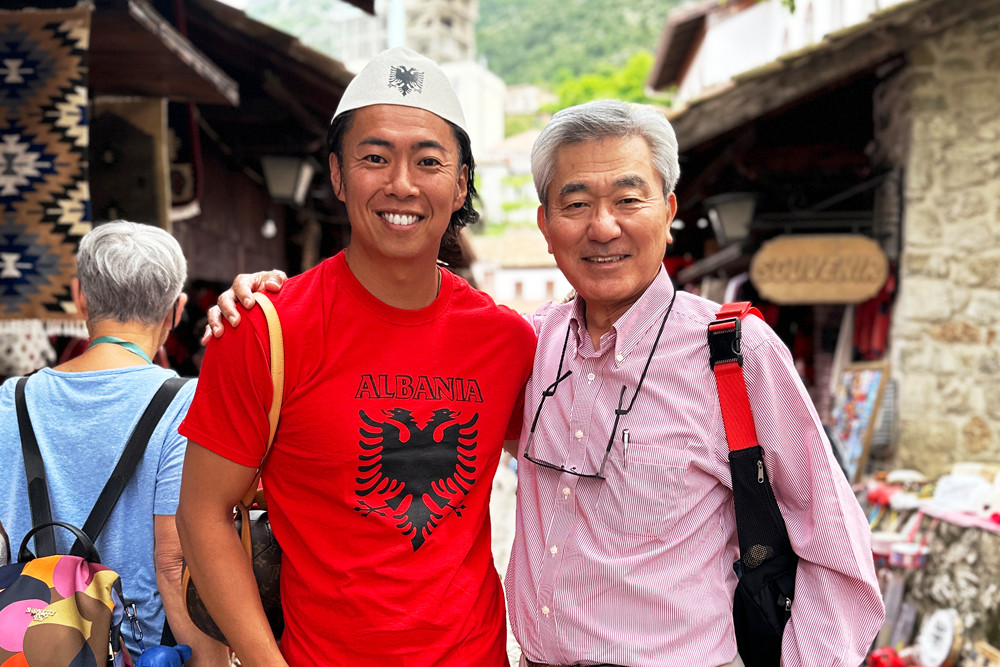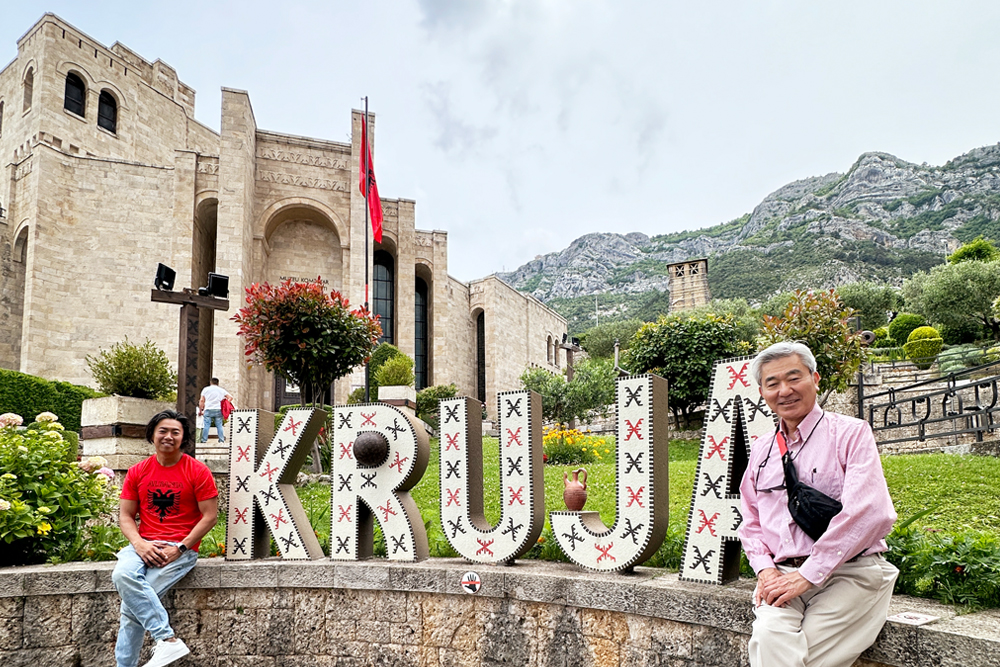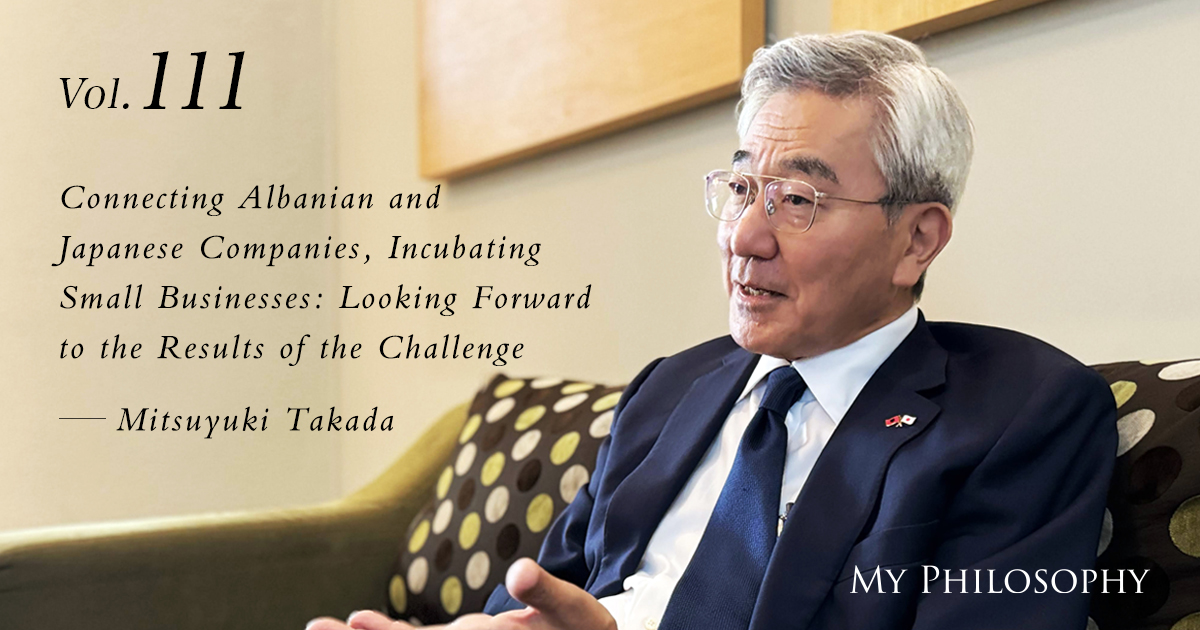
From an Executive Officer and Advisor at Mitsubishi Corporation to the Ambassador to Albania, Mitsuyuki Takada is now striving to connect Albanian and Japanese companies. Moving from big business at Mitsubishi to nurturing small businesses, he is sowing seeds with care. At 65, he shares his dreams and challenges with us.
Profile
Vol.111 Mitsuyuki Takada
President and CEO of Albalkan Corporation
Mitsuyuki Takada was born in Semba, Osaka and raised in Yao City. He graduated from the Faculty of Economics at Keio University in 1981. He joined Mitsubishi Corporation, serving as General Manager of the Steel Products Division, Executive Officer, President of Mitsubishi Corporation of Australia and New Zealand, General Manager of Business Operations, and President of the Japanese Chamber of Commerce & Industry, Melbourne. He became a Visiting Professor at Otemon Gakuin University in 2018 (retired October 15, 2020). He was appointed Ambassador Extraordinary and Plenipotentiary to Albania on October 19, 2020. Retired from the Ministry of Foreign Affairs in December 2023 and established Albalkan Corporation (consulting firm) in Albania in May 2024.
Education That Taught the Basics of Life
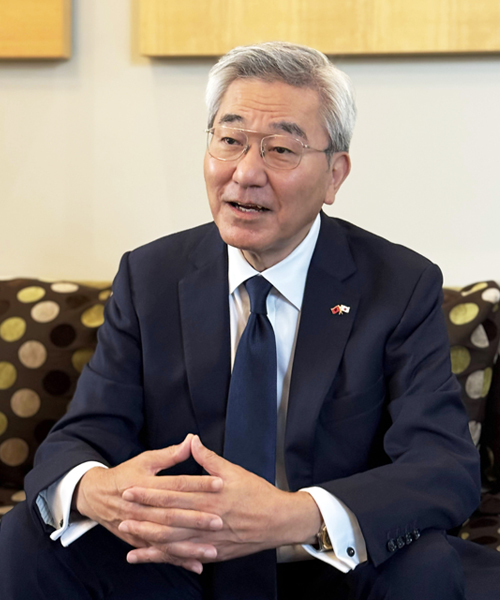
The education I received at Otemon Gakuin Elementary School had a profoundly positive impact on my life. Otemon Gakuin Elementary School was established in 1888 by the Kaikosha, a military-affiliated organization, and was initially intended for the education of the children of military officers. It is one of the private elementary schools in western Japan with a long history. My father chose the school because he believed it offered high educational standards and strict discipline. I liked the school building’s location in front of Osaka Castle. Every day we had national flag-raising ceremonies and morning exercises, and the discipline was strict. In the kendo club, teachers would say, “Come at me,” and we’d be struck quickly. It was the Showa era, after all, so that was the norm. However, the atmosphere was generally relaxed and calm, with many children from well-known Osaka families.
When it came time for junior high, my parents suggested I should experience different stimuli, so I went to a public junior high. It was a learning experience, as it was different from private school. High school was La Salle in Kagoshima. La Salle was primarily a boarding or lodging school, and I thought it might be good to live away from my parents. Perhaps I was independent-minded. Out of 250 students, about 50 commuted from home, while the remaining 200 came from all over the country. As a result, it had a unique culture not found in Osaka or Tokyo. It was an open and cosmopolitan atmosphere. Everyone studied hard, but it wasn’t overly competitive; it was a lively and fun environment with peers striving to improve together.
Two Teachings from Professor Hiroshi Kato That I Still Cherish
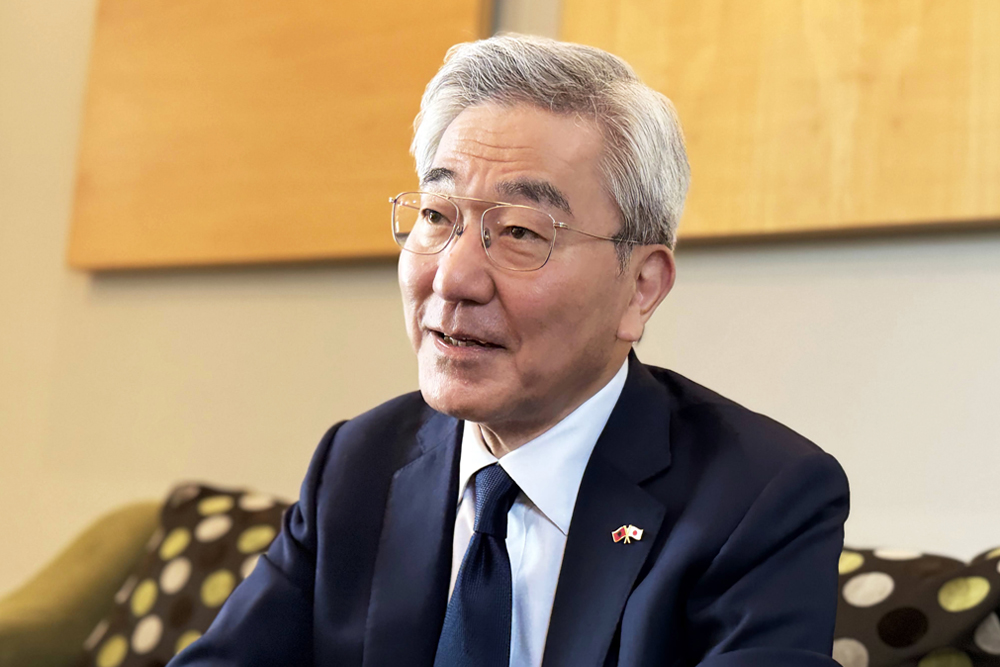
At that time, I had two dreams for the future: one was to become a bureaucrat and serve my country, and the other was to engage in global business with a general trading company. At one point, I realized that I wasn’t suited to being a bureaucrat. It didn’t fit my nature to follow rules rigidly; I wanted to move freely. So, somewhere in my heart, I thought it would be better to enter a private company.
With these feelings, I took the university entrance exams, failed to get into the University of Tokyo, and was accepted by Keio University. If I were to become a bureaucrat, the University of Tokyo was essential, but for private companies, Keio was perfectly fine, and I had decided not to wait for a year to reapply to the University of Tokyo. I wanted to enter society as soon as possible. Moreover, the cultures of Keio and Otemon Gakuin were very similar—calm and filled with good people—so I quickly decided on Keio.
When choosing a seminar in my third year, I thought studying economic policy would be beneficial for encountering various situations as a working adult. So, I joined Professor Hiroshi Kato’s seminar. This seminar was tough. There were 17 sub-seminars and 2 main seminars a week, and 18 seminar students were divided into three groups: Comparative Systems, Japanese Economy, and Planned Economy. We had to write a thesis during the summer break, which meant that we had to prepare daily from the spring of our third year to meet this goal. It was a daily routine of reading materials, making summaries, and discussing them. We even had overnight training camps, so it felt like living with the seminar students. Many people might know that Professor Kato was an advisor to Prime Ministers Ryutaro Hashimoto and Junichiro Koizumi. He promoted the privatization of Japanese National Railways, Nippon Telegraph and Telephone Public Corporation, Japan Tobacco, and the postal service. Professor Kato taught me two things: one is to “know contentment,” and the other is to “thank those who helped you when you are happy, and blame yourself when you feel you’ve failed.” These two teachings still resonate with me.
The Basics of Business: Loving and Trusting
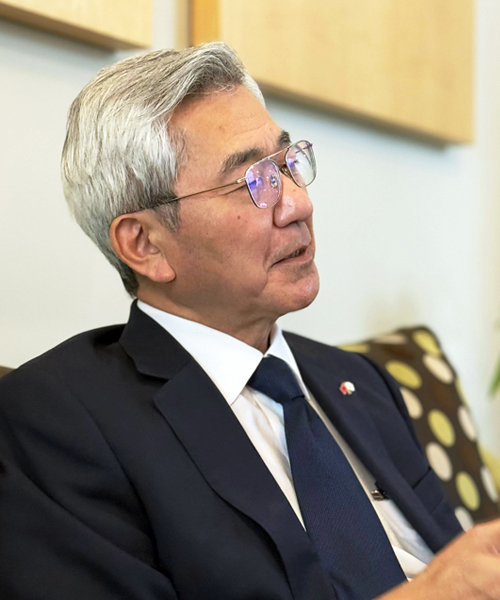
When deciding on a company, I was uncertain about which general trading company to choose, but Professor Kato advised me, “Go to Mitsubishi Corporation, and work hard there.” He encouraged me, saying, “If someone who has studied diligently for four years like you can’t get in, then no one can.” This gave me the confidence to take the interview.
After joining, I was assigned to the steel exports division, which I was excited about. In the fall of my second year, I was sent on a business trip to Canada and the United States. Arriving in Detroit via Chicago, I was amazed by the vastness of America and the size of the pancakes at breakfast. With my limited English skills acquired only from exam studies, I was tasked with interpreting for Japanese company representatives during meetings with local clients, a challenging yet memorable experience. There was much to learn on my first overseas business trip.
Until 1986, I was in charge of North America, but with organizational changes, the focus shifted from regions to product categories. I then started handling countries like Thailand, Malaysia, Australia, and others in Asia-Oceania. In 1989, I was assigned to Korea for two and a half years, which was also a learning experience. At that time, the import of Japanese products was prohibited in Korea, making daily life inconvenient. I learned the importance of working together with local employees, treating them the same as Japanese staff. This experience was valuable in subsequent roles in Japan, Australia, New Zealand, and Albania.
The key is to love the country you’re in. Many people complain about their host countries, but it’s easy to find things you dislike. Pointing them out won’t change anything. Whether it’s the national character, culture, or food, if you don’t find something to appreciate, you can’t build a good relationship. Even if there are things you can’t accept, there’s no need to voice them. I still love Korea and have many friends there. Working in a tough environment like Korea gave me the confidence to feel I could work anywhere in the world. The basics of business are the same worldwide: always consider the other party and understand what they need. I often tell young employees who try to work at their own pace, “Business is like dating. It’s important to listen to what the other person likes and wants.” Another key point is building trust with local people. Local employees know more about the culture, economy, and history of their country than a foreigner like me ever could. There will inevitably be things that must be entrusted to local staff. To do this, you must be trusted and trust them in return. It’s impossible to do everything yourself. It’s been several years since I left the general trading company business, but I feel like I’ve accomplished my work.
Cultivating Business Connections Between Albania and Japan
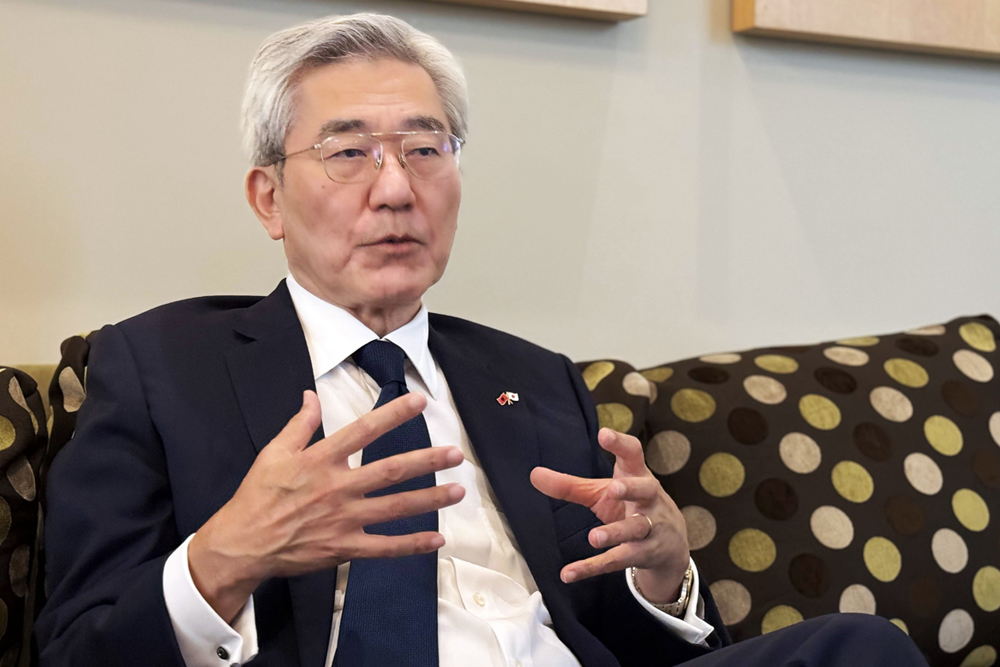
At the age of 62, I was appointed as Japan’s Ambassador to Albania. Japan has embassies in many countries, but some ambassadors are appointed from outside the Ministry of Foreign Affairs. I was the third ambassador from Mitsubishi Corporation, with others coming from various general trading companies and financial institutions. I never dreamed I would be appointed ambassador, so it was a complete surprise. The decision on where I would be posted was made just before my appointment, and I was surprised to hear it would be Albania, a country I knew little about. I arrived at my post in late November 2020, right in the middle of the COVID-19 pandemic.
During my time as President of Mitsubishi Corporation Australia and New Zealand, I had some experience interacting with ambassadors, so I had a basic understanding of the role. The ambassadors were warm, skilled at interacting with people, and created a great atmosphere. When I became an ambassador, I realized that, unlike in business, where profit is the main goal, I needed to be careful with my actions and words, representing the country. I thought about how I could contribute to strengthening the relationship between Albania and Japan. Albania is a pro-Japanese country, and I worked on various initiatives to further increase Japan’s presence. For example, through “Grassroots ODA,” we donated medical equipment, fire trucks, and ambulances to local governments and held events like Japan Week to deepen understanding of Japanese culture. As a businessperson-turned-ambassador, I particularly focused on expanding trade between the two countries, achieving some success.
During my time as ambassador, I introduced new business opportunities to private companies from both countries, and several companies expressed interest in forming business partnerships or joint ventures. Now, I am looking to help build new businesses. The scale of these businesses is much smaller than what I handled at Mitsubishi Corporation, but I think it’s fine as long as they increase in number. I want to take on the challenge of nurturing these businesses while incubating them. In the end, I’ve come to really like Albania. It’s a highly pro-Japanese country with good weather, friendly people, delicious food, beautiful scenery, and a safe environment. I’m looking forward to the results of my new challenges here.
This interview was a great opportunity to reflect on my professional life. I recalled the work I did during my time at Mitsubishi Corporation, from elementary school to university and then during my three years as ambassador to Albania. It allowed me to look back on my life and career from a broader perspective. As a result, I once again felt that “you never know what life will bring; it’s incredibly exciting and thrilling,” and I want to continue enjoying life to the fullest.
One thing I realized deeply is that “I am here today because of the support of wonderful parents, family, friends, mentors, colleagues, juniors, and business counterparts.” At the age of 66, I started a business in Albania, and I will continue to work on building new business relationships between Japan and Albania. I appreciate your continued support and guidance.
President and CEO of Albalkan Corporation
Mitsuyuki Takada
In this interview, I was deeply impressed by Mr. Mitsuyuki Takada’s rich life experiences and profound philosophy. His career transition from Mitsubishi Corporation to serving as the Ambassador to Albania, and his enthusiasm for new business challenges, has been a source of courage and inspiration for many people.
What struck me most was Mr. Takada’s emphasis on understanding and appreciating different cultures. His experiences working in Korea and his new challenges in Albania highlight the importance of building relationships based on respect and trust, regardless of the country or culture. His story of personally experiencing Albania’s beauty and charm deepened his affection for the country, which was particularly memorable.
 Mr. Takada’s narrative also reflected his pride as a Keio alumnus and his influential encounter with Professor Hiroshi Kato. Professor Kato appeared in Vol.12th of “My Philosophy,” and I recall the valuable opportunity I had to interview him during his later years in 2012. Hearing stories from Professor Kato’s younger days was an incredibly enriching experience.
Mr. Takada’s narrative also reflected his pride as a Keio alumnus and his influential encounter with Professor Hiroshi Kato. Professor Kato appeared in Vol.12th of “My Philosophy,” and I recall the valuable opportunity I had to interview him during his later years in 2012. Hearing stories from Professor Kato’s younger days was an incredibly enriching experience.
Through this interview, I was reminded of how interactions with people from different cultures and backgrounds can greatly expand our horizons and foster growth. Mr. Takada’s fearless approach to new challenges and his efforts to deepen connections with the world will undoubtedly inspire many. I look forward to following and supporting his future endeavors.
Additionally, the opportunity to explore Albania, guided by Mr. Takada, was a priceless experience. I strongly feel that I want to work together with Mr. Takada in bridging business opportunities between Albania and Japan.
At MAK Albania Hotel Edited by: DK Sugiyama | Photographed by:Roxanna Tuttle




